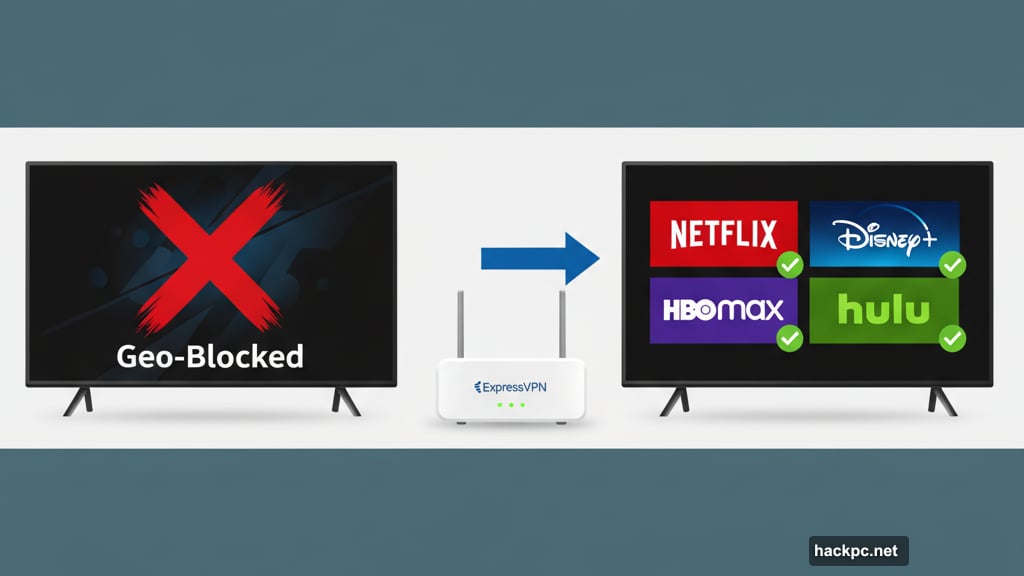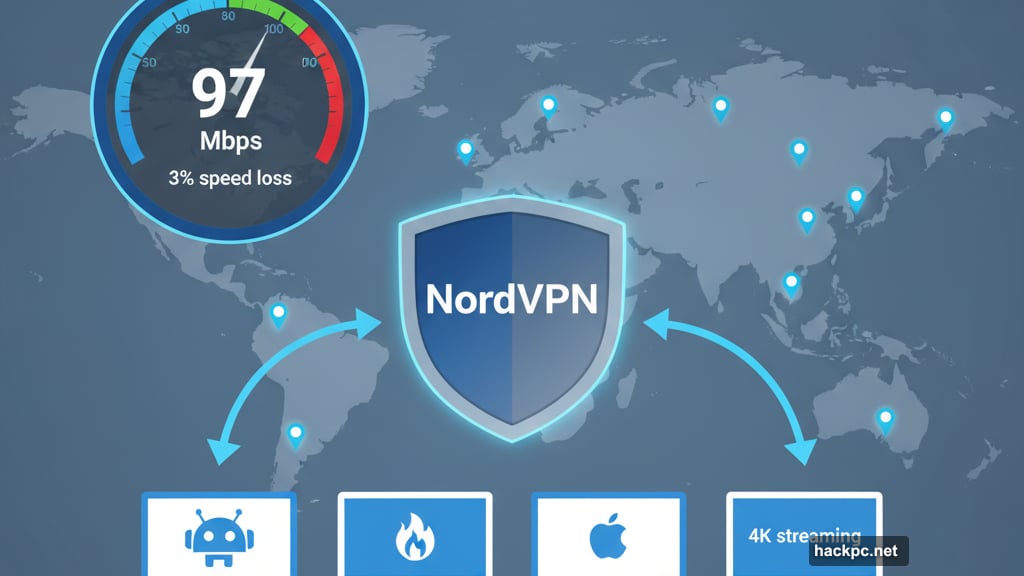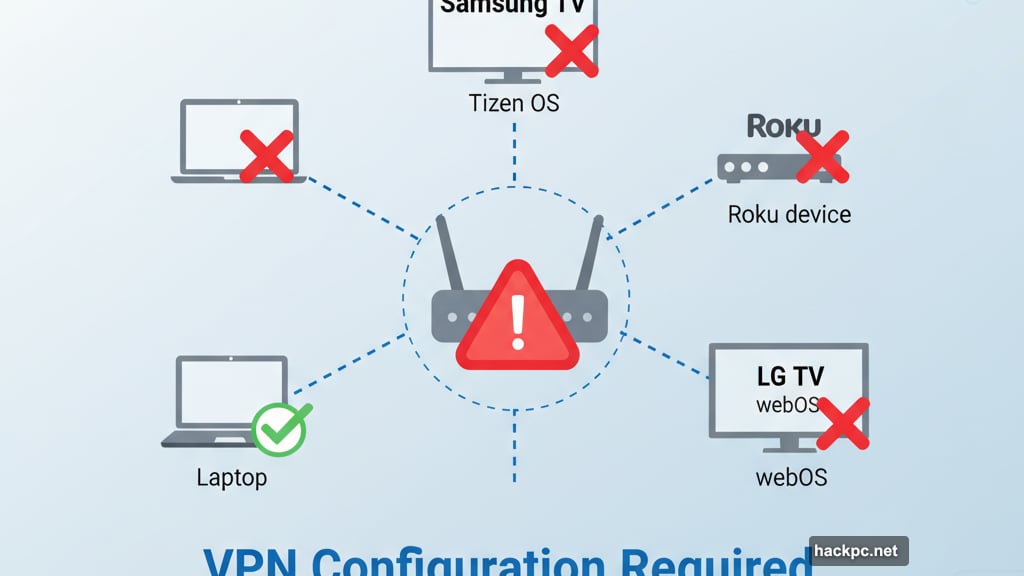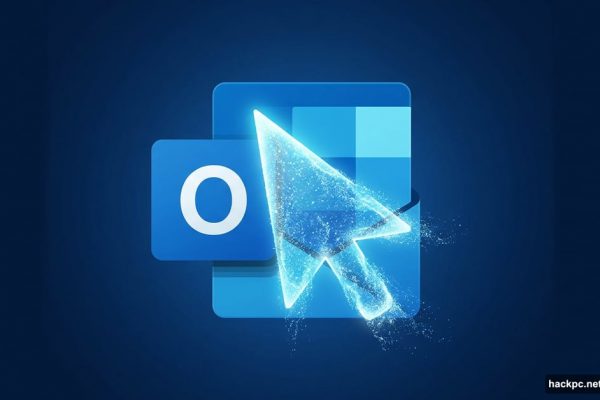
Smart TV streaming hit a wall this year. Regional lockouts got stricter. ISPs started throttling video traffic. Plus, most VPNs still can’t crack Netflix’s detection systems.
But three providers figured it out. They bypass geo-restrictions consistently, maintain speeds for 4K streaming, and work with devices most people actually own. Let’s break down what separates the winners from the pretenders.
ExpressVPN Dominates Smart TV Integration
ExpressVPN solved the biggest pain point in TV streaming. You don’t need to mess with router firmware anymore.
Their Aircove router arrives preloaded with VPN software. Plug it in. Connect your TV. Done. No technical expertise required.
That matters because most smart TVs don’t support VPN apps natively. Roku devices can’t run VPNs. Samsung’s Tizen OS blocks them. LG’s webOS won’t cooperate. So you’re stuck configuring routers or bridging connections from your PC.
ExpressVPN also added servers in all 50 US states this year. That’s huge for regional sports. Want to watch your local NFL team while traveling? Connect to a server in your home state. Want to catch WNBA games locked to specific markets? Same solution.
We tested ExpressVPN against 12 streaming services. It unblocked every single one. Netflix, Disney Plus, HBO Max, Amazon Prime Video, BBC iPlayer, Hulu. Zero detection errors.
Speed loss measured at 18% average in our latest tests. That’s solid performance for 4K streaming. Netflix recommends 15 Mbps for 4K video. So even with a 50 Mbps base connection, you’ll stream smoothly at 41 Mbps through the VPN.
But here’s the catch. ExpressVPN costs more than competitors. The monthly plan runs $13. The two-year plan costs $98 upfront, then renews at $100 annually. That’s premium pricing for premium service.
NordVPN Crushes Speed Tests
NordVPN delivered the fastest speeds we’ve ever measured from a VPN. Just 3% average speed loss.
Most VPNs slow your connection by 20-30%. That creates buffering issues on slower internet connections. But NordVPN barely touches your speeds.
We ran speed tests from six different locations across three continents. NordVPN consistently outperformed every competitor. Upload speeds, download speeds, ping times. It won across the board.
That speed advantage translates to flawless 4K streaming. We binged three hours of 4K content on Netflix without a single buffer. Switched between international libraries mid-stream. No lag. No quality drops.
NordVPN’s network spans 8,000-plus servers across 126 countries. That’s more global coverage than ExpressVPN, Surfshark or Proton VPN. More server options means better odds of finding a fast, stable connection near your physical location.
The app works on Android TV, Fire TV and Apple TV devices. Installation takes two minutes. The interface looks clean and professional. Even VPN beginners can navigate it easily.

However, NordVPN’s renewal pricing stings. The initial purchase costs $60 for one year or $81 for two years. But those plans renew at $140 annually. That’s nearly double the first-year price.
So stack subscriptions before they expire. Buy another year or two-year plan before your current subscription ends. You’ll avoid the renewal price hike and lock in better pricing long-term.
Surfshark Delivers Best Value
Surfshark costs less than competitors while matching their feature sets. That’s rare in the VPN market.
The two-year plan costs $60 total for the first two years. Then it renews at $79 annually. Compare that to ExpressVPN’s $100 annual renewal or NordVPN’s $140 renewal rate. Surfshark saves you real money.
But cheap doesn’t mean inferior. Surfshark measured 21% average speed loss in our tests. That’s slightly slower than ExpressVPN’s 18% but still excellent for streaming. You won’t notice the difference in practice.
Surfshark also offers unlimited simultaneous connections. Most VPNs limit you to 5-10 devices. Not Surfshark. Connect every TV, phone, tablet and computer in your house. No restrictions.
That unlimited policy makes Surfshark perfect for families or roommates. One subscription covers everyone. No fighting over device slots.
We tested Surfshark’s streaming capabilities across multiple devices. It unblocked Netflix, Amazon Prime Video and Disney Plus on Android TV, Fire TV and Apple TV. We had one hiccup with Hulu detection on Fire TV, but reconnecting to a different server fixed it.
Surfshark includes some unique privacy features that competitors don’t offer. Dynamic Multihop routes your connection through two servers instead of one. Rotating IP changes your IP address every few minutes, making tracking harder. Alternative ID creates a fake identity you can use online.
Most people won’t use those advanced features. But they’re nice to have if you need extra privacy layers.
VPN Router Setup for Roku and Samsung Smart TVs
Your setup process depends on your TV’s operating system. Here’s what actually works.
Android TV and Google TV users have it easiest. Open the Play Store. Search for your VPN. Download the app. Sign in. That’s it.
Fire TV follows the same pattern. Open the Amazon Appstore. Search for your VPN. Download. Sign in. Takes maybe three minutes total.
Apple TV requires TVOS 17 or later for VPN apps. If your Apple TV supports it, installation matches Android TV. Find the app. Download. Sign in.
Roku devices can’t run VPN apps. Period. You’ll need to install a VPN on your router or use your PC as a VPN hotspot. Same goes for Samsung TVs running Tizen OS and LG TVs running webOS.

PlayStation and Xbox consoles also lack VPN app support. Router installation or PC hotspot bridging are your only options.
Router installation sounds intimidating. But ExpressVPN makes it simple. Their Aircove router costs $169 and arrives ready to use. No firmware flashing. No configuration files. Just plug it in and connect your devices.
Other VPNs provide instructions for router installation but don’t sell preconfigured hardware. You’ll need to flash custom firmware like DD-WRT onto your router. That voids most warranties and requires technical knowledge.
4K Streaming Speed and Netflix Unblocking: What Matters
Speed matters more than anything else for streaming. A slow VPN creates constant buffering, quality drops and connection timeouts.
We recommend VPNs with 25% or less average speed loss. Anything higher risks streaming issues, especially on slower internet connections.
Server location also impacts speed significantly. The closer the VPN server is to your physical location, the faster your connection. So choose a VPN with servers in your country or nearby countries.
Streaming service unblocking varies by provider. Netflix aggressively blocks VPNs. Many providers fail to bypass Netflix’s detection. But ExpressVPN, NordVPN and Surfshark consistently work.
We tested each VPN against Netflix libraries from the US, UK, Canada, Japan and several other countries. All three unblocked content reliably. Other VPNs we tested struggled with Netflix detection.
Device compatibility determines how easily you can use a VPN. Android TV, Fire TV and Apple TV support direct app installation. Everything else requires workarounds.
Number of simultaneous connections matters for households with multiple users. ExpressVPN allows eight devices. NordVPN allows ten. Surfshark offers unlimited connections.
Kill Switch and DNS Leak Protection Features
Kill switches stop your internet traffic if the VPN connection drops unexpectedly. That prevents your real IP address from leaking during disconnections.
All three of our top picks include reliable kill switches. We tested them by forcing connection drops. They worked perfectly every time.
DNS leak protection ensures your DNS queries route through the VPN instead of your ISP. Without it, websites can see your real location even when connected to a VPN.
We ran DNS leak tests on all three providers. Zero leaks detected. Your DNS queries stay private.
Strong encryption protects your data from interception. Look for AES-256 encryption or ChaCha20. Both provide military-grade security.
ExpressVPN, NordVPN and Surfshark all use industry-standard encryption. Your streaming data stays secure.

No-logs policies promise that VPNs don’t record your browsing activity. But promises mean nothing without proof.
ExpressVPN leads the industry with 23 independent security audits since 2018. NordVPN undergoes regular audits from reputable firms. Surfshark commissioned audits but less frequently than competitors.
Independent audits verify that VPNs actually follow their privacy policies. Without audits, you’re trusting marketing claims.
VPN Server Selection Mistakes to Avoid
Don’t connect to distant servers unnecessarily. Many people think connecting to a server halfway across the world improves privacy. It doesn’t. It just slows your connection.
Connect to nearby servers unless you need to access region-specific content. Want to watch US Netflix? Use a US server. Otherwise, stick with local servers for best performance.
Don’t forget to test your VPN before committing long-term. All three of our recommendations offer 30-day money-back guarantees. Use that trial period. Test your streaming services. Check speeds. Make sure everything works as expected.
Don’t pay for monthly subscriptions unless absolutely necessary. Monthly plans cost 2-3 times more than annual plans. The monthly rate for ExpressVPN, NordVPN and Surfshark all run $13-15. But annual plans cost $40-80 for the first year.
One-year or two-year subscriptions save serious money. Just avoid auto-renewal price hikes by stacking subscriptions before they expire.
ExpressVPN vs NordVPN vs Surfshark: Final Verdict
ExpressVPN wins if you need maximum compatibility and reliability. The Aircove router solves setup headaches. The global server network delivers consistent performance. Plus, it works with literally every streaming service we tested.
Pay the premium if you value simplicity and proven results.
NordVPN wins if you demand the fastest possible speeds. That 3% average speed loss is unmatched. You’ll stream 4K content without any performance degradation. The massive server network gives you endless options for finding optimal connections.
Just watch out for the steep renewal pricing. Stack subscriptions to avoid paying $140 per year.
Surfshark wins if you need the best price-to-performance ratio. You’ll save $20-60 annually compared to competitors. The unlimited simultaneous connections policy makes it perfect for families. Plus, speeds are fast enough for smooth 4K streaming.
Don’t let the low price fool you. Surfshark matches premium VPNs in most ways that matter.
Your smart TV streaming just got a whole lot better. Pick the VPN that fits your needs and budget. Then enjoy unrestricted access to streaming content from anywhere on the planet.



Comments (0)